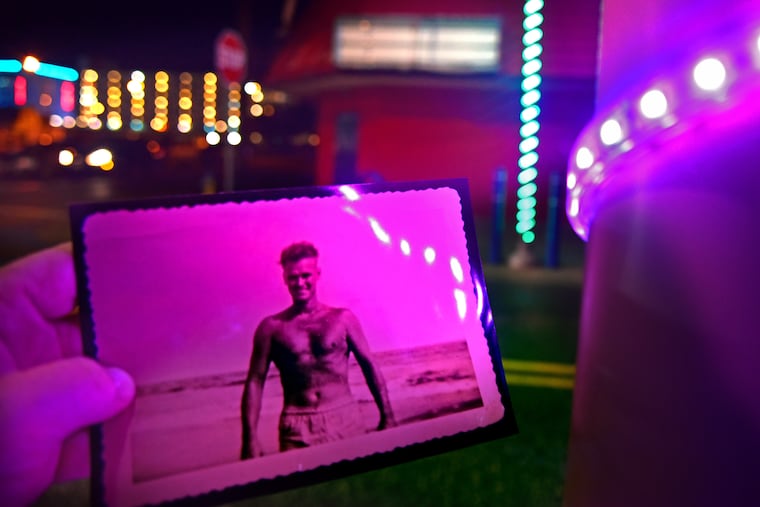The bouncer who became king of Wildwood
Dave Snyder was a Wildwood legend and a bouncer at 13 clubs.

WILDWOOD — Each day, like the sun arcing across a summer sky, Dave Snyder moved punctually from one end of Wildwood to the other. At night, like the moon, his gleaming white hair, white shirt, and smile illuminated this brassy beach town.
They called him “the Legend,” and for six decades, Snyder was a local landmark, as familiar and distinctive a sight as the boardwalk tram cars.
Wearing only a white bathing suit to accentuate his prized tan and physique, he strode 10 miles daily along the beach, a back-and-forth journey across this 5-mile-long barrier island.
En route, he’d pause to talk with lifeguards, townies, returning vacationers, and, particularly, women.
“Dave was a good-looking guy, and ladies loved him,” said Chuck Clark, a beach friend. “And he knew when their husbands were out of town.”
Snyder was one of those quirky, follow-the-sun characters who populate beach towns. Here, there also was Brownie the Fudgy Wudgy Man, who trudged through hot sand lugging a heavy cooler of dry ice and ice cream, but always with a song, and Bubble Gum Rocky, who for whatever reason dispensed Bazooka gum from a bag he carried everywhere.
Often, like Snyder, these were unmarried and unmoored men. They all possessed some characteristic that, despite workaday jobs, made them stand out, made them memorable. And in October, when the tourists and the baking sun disappeared, they headed south for other jobs in other beach towns.
Snyder was unusual in one way. Until his 70s, he stayed year-round in Wildwood, painting houses during the lonely winters, continuing his long walks on empty beaches.
“Everybody knew him,” recalled Clark, 65, a Frankford native who now lives in Maple Shade. “He was always so good to us kids. He always had a, `Hi, how you doing?’ for me, for everybody.”
Born in Philadelphia, Snyder moved here when he was a boy. He left school in eighth grade — expelled for talking too loudly and listening too infrequently, he liked to say — and never returned. He took odd jobs, worked briefly as a cop, then in 1948 was hired as the Hurricane Club’s tuxedo-wearing bouncer.
“I decided it might be fun to work in night clubs because I liked hanging around them,” he told The Inquirer in 1994.
Through the years, 13 Wildwood clubs employed him, including the Fairview, Hurricane East, Jones Boys, Oasis, and Moore’s Inlet.
Following his long walks, this blue-eyed, barrel-chested, meticulously neat man would shower, change, and, as if he were the neon-lit strip’s nighttime king, preside over Pacific Avenue from his throne, a stool he set up at the door of wherever he worked.
After the tuxedo era ended, Snyder wore a crisp white shirt adorned with epaulets and a gold badge that lent him an official air. Later he switched to torso-hugging T-shirts. Always white.
Pacific Avenue’s cops, cabbies, and clerks were his friends. Most stopped to chat, to share a joke or a bit of sports trivia. Drivers plodding through the narrow avenue’s traffic would wave to Snyder or honk their vehicles’ horns in salute.
I had a casual acquaintance with him in the summer of 1971. If all of us, as an old Protestant hymn promises, are granted one perfect “season of clear shining,” then that was mine.
After my 12-hour shifts at a boardwalk shop ended at 11 p.m., I’d meet my girlfriend — and future wife — at the Shamrock, an Irish bar kitty-corner to the Fairview, the popular garage-band club where Snyder then bounced.
For $1, we’d split seven small glasses of beer while trying to talk over piano man Jimmy Bolger’s nostalgic wailings, then head across Pacific to catch a few sets by our favorite band, Supa Heat.
Before you could enter the Fairview, you paid a cover and got the once-over from Snyder, who by then had perfected his craft.
He had an uncanny radar. He knew who was 21 and who wasn’t. He knew who was mildly inebriated and who was too drunk or stoned to gain admission. Everyone got a smile and a wisecrack.
Despite the job, Snyder rarely encountered trouble. (“You didn’t mess with Dave,” Ernie Troiano, Wildwood’s longtime mayor, told the Daily News in 2008.) In five decades, Snyder once claimed, there were just three arrests.
“Most of the time, if anyone gave me any stuff, I’d let them go, because I didn’t want to go to court,” he said in ’94. “I only had some people locked up because they took a poke at me.”
We were 21 then, legal drinkers and Fairview regulars. But Snyder still stopped us each night. He’d take a cursory look at our IDs, flirt with my girlfriend, and criticize my bushy hair or purple bell bottoms. After he learned I was an Evening Bulletin sports intern, he’d pepper me with trivia questions.
“How many times did Ty Cobb steal home?” was one I remember.
When we’d leave at 2 a.m., he’d still be sitting there. And as we moved down the dark and quiet street toward the apartment my girlfriend shared with college friends, occasionally stopping at a store window to look and dream, we could still hear Snyder’s booming laugh.
He died in 2008 at 88, his death, in a way, a metaphor for the fate that already had befallen his beloved Pacific Avenue.
Wildwood, where Chubby Checker first performed “The Twist” and Bill Haley and the Comets debuted “Rock Around the Clock,” has embraced its 1950s heyday. So it’s not a stretch to imagine that forlorn street as a long-abandoned ’57 Chevy. Every few years, some who recall the glory days try to get it up and running again.
But decades of rust and neglect are difficult to remove, and Pacific Avenue, with its empty storefronts and shuttered clubs, remains a faded reminder of a shiny chrome era when Dave Snyder ruled the night.